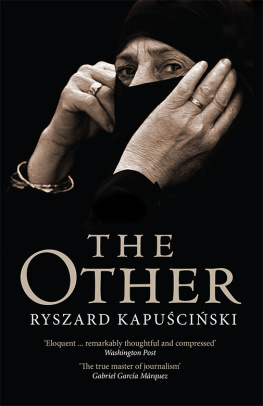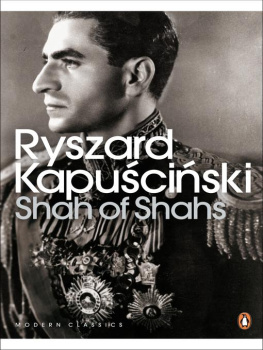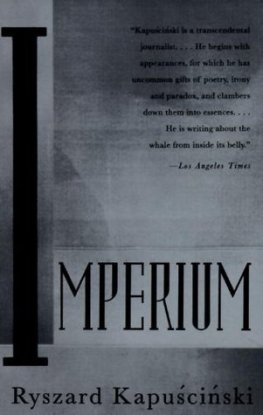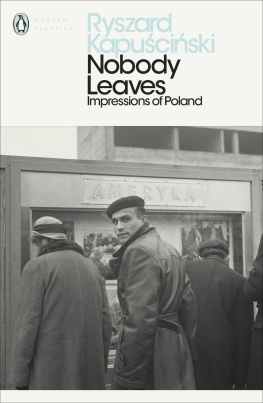THE OTHER
RYSZARD KAPUCISKI
Translated by Antonia Lloyd-Jones
with an introduction by Neal Ascherson


This publication has been subsidized by Instytut Ksi ki
ki
POLAND translation programme
This paperback edition published by Verso 2018
Paperback edition first published by Verso 2009
English-language edition first published by Verso 2008
Ryszard Kapuciski 2006, 2008, 2009, 2018
Translation Antonia Lloyd-Jones 2008
Introduction Neal Ascherson 2008, 2009, 2018
First published as Ten Inny Wydawnicto Znak, Krakw 2006
All rights reserved
The moral rights of the author have been asserted
1 3 5 7 9 10 8 6 4 2
Verso
UK: 6 Meard Street, London W1F 0EG
US: 20 Jay Street, Suite 1010, Brooklyn, NY 11201
versobooks.com
Verso is the imprint of New Left Books
ISBN-13: 978-1-78663-596-9
ISBN-13: 978-1-78478-527-7 (UK EBK)
ISBN-13: 978-1-78478-528-4 (US EBK)
British Library Cataloguing in Publication Data
A catalogue record for this book is available from the British Library
Library of Congress Cataloging-in-Publication Data
A catalog record for this book is available from the Library of Congress
Typeset by Hewer Text UK Ltd, Edinburgh
Printed in the USA by Maple Vail
CONTENTS
The subject of the lectures collected in this volume is the Other. They were delivered as follows:
Viennese Lectures (I, II, III), 13 December 2004, at the Institut fr die Wissenschaften vom Menschen in Vienna;
My Other, 12 October 1990, at the International Writers Symposium in Graz;
The Other in the Global Village, 30 September 2003, during the inauguration of the academic year at the Father Jzef Tischner Senior European School in Krakw;
Encountering the Other as the Challenge of the Twenty-First Century, 1 October 2004, on the occasion of being awarded the title of doctor honoris causa at the Jagiellonian University in Krakw.
R. K.
Towards the end of this book, Kapuciski quotes the great Polish-born pioneer of social anthropology, Bronisaw Malinowski. In his book Argonauts of the West Pacific, Malinowski wrote that to judge something, you have to be there.
Its a contestable generalisation. Its obvious that, of those who passed judgements on the nature of the Hitler or Stalin regimes, and who often perished in the effort to enforce those judgements, extremely few had literally been there. However, Malinowskis line is an indispensable motto for all good journalists. The late Ryszard Kapuciski followed it throughout his career, pursued it indeed to extremes of danger and isolation which few of his colleagues ventured to endure. Did he really have to find himself awaiting execution in a dirty African cell in order to judge the politics of Congolese independence? No, but he added to his ability to judge fear and humiliation and because he got out of that cell to describe the sudden savour of life after the expectation of death.
His most famous book, The Emperor, also demonstrates the importance of being there, in that case settling in Addis Ababa in order to seek out and interview the surviving courtiers of the fallen Haile Selassie. It should be added that Kapuciski understands being there as requiring a dimension in time as well as space. Its strange to recall that for much of his life he was an agency journalist, often subject to the insane pressure of deadlines and call-backs and updates at any hour of the day or night. His instinct, in complete contrast, was to stop the clock and let people take all the hours and days they needed to disentangle, unwind and lay out their story. This is what he did in The Emperor, whose enquiries seem to take place across weeks and months, as well as in dark lanes and shuttered houses.
Kapuciski is usually remembered in Western Europe and America as an iconic foreign correspondent and as the writer of narratives about his experiences in Africa, Latin America and Asia, which were famous for their often surreal imagery, their revelations of misery and cruelty, and the fastidious quality of their writing. He was certainly a king at his craft, and also a brave, witty man who could be a good comrade in the field. A question often raised about him later in his career, but never convincingly answered, was where in him the frontier between literature and reporting ran. Its a hard one to answer, not least because there is no such wire barrier (floodlit and dog-patrolled) between the two forms. Some people thought that Kapuciski made things up, that (for example) the marvellous recollections by the Ethiopian courtiers in The Emperor were largely imaginative reconstruction or even fiction. There may be something in that. Kapuciski, I think, did what many journalists do at times: he selected from his notes, perhaps changed the order in which things were said, dropped the parts which didnt interest him, and then sharpened up the best passages not for sensational revelation purposes, but for literary effect. For me, such heightening doesnt really detract from what was written, as long as the text is not presented as a verbatim record.
But not many of his readers have absorbed Kapuciski as a thinker, as an intellectual who enjoyed philosophical theorising and ethical reflection on the margins of Catholic theology. He was always a wide, compulsive The Other will therefore come as a surprise. It consists of a group of collected lectures, one dating back to 1990, but the others delivered in the last five years of his life at gatherings in Vienna and in Krakw. Their subject is the encounter, above all the white European encounter, with unfamiliar cultures whose difference may be distilled into an essential Otherness and loaded with every kind of discourse of ethical and technical superiority. Kapuciski saw a lot of that distilling. Himself immune to its products (his view was the Herodotean assessment: that all peoples are different and that its natural that each people thinks its own ways are best), he has witnessed every variety of imperial arrogance and ignorance.
Otherness is not, of course, a new topic. Its interesting that Kapuciskis references and inspirations on the subject are almost all from Polish sources. Malinowski is one. Another is Father Jzef Tischner, a senior Krakw theologian and a widely read writer on ethics who was very close to the late Pope John Paul II. Tischner, in turn, drew strongly on the work and thought of Emmanuel Lvinas (d. 1995), and his insistence on the primacy of ethics in philosophical enquiry. Lvinas (only survivor of a Jewish family in Lithuania which perished in the Holocaust) had moved to Paris in 1923, and studied later in Freiburg under Husserl and Heidegger. Although he was not Polish and remained loyal to Judaism, Lvinass thought deeply influenced Polish Catholic intellectuals including Karol Wojtya, the future Pope during the Communist period.
The Other was his central topic. Lvinas considered that philosophers were wasting their time on metaphysics and epistemology. Although he lived in France, the land of Descartes, he did not believe that I think, therefore I am, but that the self is only possible through the recognition of the Other (a famous phrase quoted in these lectures).
This notion informs the conclusions Kapuciski draws from his travelling and reporting encounters in other continents. But there is a background here which the reader needs to bear in mind. This author spent most of his life writing for a Polish readership, a readership isolated by the Cold War inside its own frontiers, which had inherited a traditional taste for Otherness as a form of exotic entertainment. Throughout central Europe, and to some extent in Germany too, landlocked peoples without overseas empires or the opportunity for distant travel longed for amazing tales about remote continents. In the nineteenth and twentieth centuries, a whole genre of travel writing sprang up to satisfy that longing for palm trees, wide-open spaces, strange animals and bizarre tribes. The German novels of Karl May, set in an imaginary Wild West, gripped many landlocked imaginations. Later, gifted journalists set out as world-travelling reporters, serving their Czech or Polish or Hungarian readers a diet of thrilling and addictive articles which described the Other not only in terms of landscape and exotic customs, but as sites of inhuman exploitation, hunger and suffering. In the first half of the century, it was the dazzling Egon Erwin Kisch from Prague, the










 ki
ki